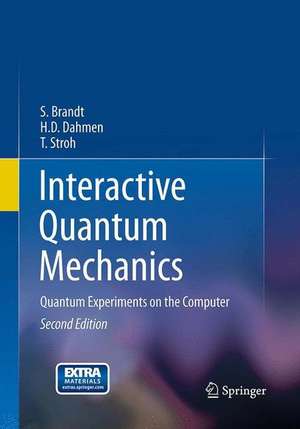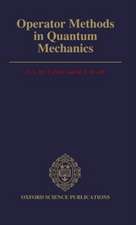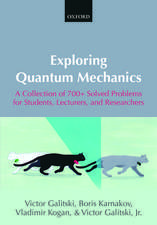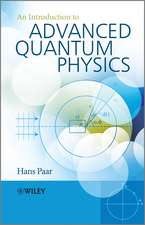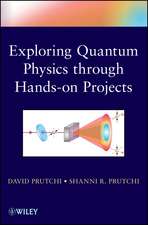Interactive Quantum Mechanics: Quantum Experiments on the Computer
Autor Siegmund Brandt, Hans Dieter Dahmen, T. Strohen Limba Engleză Paperback – 23 aug 2016
Students do no programming, and hence need no previous detailed knowledge of this. The program has a very convenient, self-explanatory user interface based on the Java software technology. The book provides a recapitulation of the basic quantum mechanical formula, a manual to the IQ program, and a complete course with more than 300 tested problems. Fully automatic demonstration sessions are provided as introduction to interactive work.
Physics topics covered include free particles, bound states and scattering in various potentials in one and three space dimensions, two-particle systems, properties of special functions of mathematical physics.
| Toate formatele și edițiile | Preț | Express |
|---|---|---|
| Paperback (1) | 426.49 lei 38-44 zile | |
| Springer – 23 aug 2016 | 426.49 lei 38-44 zile | |
| Hardback (1) | 544.16 lei 6-8 săpt. | |
| Springer – 20 ian 2011 | 544.16 lei 6-8 săpt. |
Preț: 426.49 lei
Nou
Puncte Express: 640
Preț estimativ în valută:
81.62€ • 84.90$ • 67.38£
81.62€ • 84.90$ • 67.38£
Carte tipărită la comandă
Livrare economică 08-14 aprilie
Preluare comenzi: 021 569.72.76
Specificații
ISBN-13: 9781493938247
ISBN-10: 149393824X
Pagini: 379
Ilustrații: XV, 379 p.
Dimensiuni: 178 x 254 mm
Greutate: 0.69 kg
Ediția:Softcover reprint of the original 2nd ed. 2011
Editura: Springer
Colecția Springer
Locul publicării:New York, NY, United States
ISBN-10: 149393824X
Pagini: 379
Ilustrații: XV, 379 p.
Dimensiuni: 178 x 254 mm
Greutate: 0.69 kg
Ediția:Softcover reprint of the original 2nd ed. 2011
Editura: Springer
Colecția Springer
Locul publicării:New York, NY, United States
Cuprins
Introduction.- Free Particle Motion in One Dimension.- Bound States in One Dimension.- Scattering in One Dimension.- A Two-Particle System.- Free Particle Motion in Three Dimensions.- Bound States in Three Dimensions.- Scattering in Three Dimensions.- Spin and Magnetic Resonance.- Hybridization.- Special Functions of Mathematical Physics.- Additional Material and Hints for the Solution of Exercises.- A Systematic Guide to IQ.- How to Install IQ.
Notă biografică
Dr. Siegmund Brandt is Professor Emeritus of Physics and Dr. Hans Dieter Dahmen is Professor Emeritus of Theoretical Physics at the University of Siegen. Their fields of research are the experimental and theoretical physics of elementary particles, respectively. They are joint authors of several textbooks, among them �The Picture Book of Quantum Mechanics� (3rd edition, Springer, 2001). Dr. Tilo Stroh took his Ph.D. with a thesis on computation quantum mechanics under Hans Dahmen.
Textul de pe ultima copertă
Extra Materials available on extras.springer.com
INTERACTIVE QUANTUM MECHANICS allows students to perform their own quantum-physics experiments on their computer, in vivid 3D color graphics. Topics covered include:
• harmonic waves and wave packets,
• free particles as well as bound states and scattering in various potentials in one and three dimensions (both stationary and time dependent),
• two-particle systems, coupled harmonic oscillators,
• distinguishable and indistinguishable particles,
• coherent and squeezed states in time-dependent motion,
• quantized angular momentum,
• spin and magnetic resonance,
• hybridization.
For the present edition the physics scope has been widened appreciably. Moreover, INTERQUANTA can now produce user-defined movies of quantum-mechanical situations. Movies can be viewed directly and also be saved to be shown later in any browser.
Sections on special functions of mathematical physics, coordinate systems and units, over 300 class-tested problems with hints for solutions, and a complete user’s guide to the INTERQUANTA program are also included.
No programming or computer experience is needed to use INTERQUANTA. Its Java™-based interface is as simple to use as surfing the Internet. Features of the INTERQUANTA program include:
• easy-to-use interface allowing fast change of physics parameters,
• demonstrations for each chapter illustrating new physical concepts and features of INTERQUANTA,
• electronic help files guiding users through the program,
• simple printing of user-produced graphics.
INTERQUANTA runs on:
• personal computers under Windows® and Linux,
• Macintosh computers under Mac OS X.(INTERQUANTA was tested on 32-bit systems under Windows® 98, NT, 2000, ME, XP, Vista, and 7, under Linux Kernel 2.6.13, and under Mac OS X 10.4.11 for PowerPC and x86 processors. On 64-bit systems it was tested under Windows 7, Linux Kernel 2.6.28, and Mac OS X 10.6.4 for x86_64 processors.)
INTERQUANTA’s virtual “quantum mechanics laboratory” is a uniquely innovative approach to this important but abstract field of physics, and will benefit any student of quantum mechanics.
INTERACTIVE QUANTUM MECHANICS allows students to perform their own quantum-physics experiments on their computer, in vivid 3D color graphics. Topics covered include:
• harmonic waves and wave packets,
• free particles as well as bound states and scattering in various potentials in one and three dimensions (both stationary and time dependent),
• two-particle systems, coupled harmonic oscillators,
• distinguishable and indistinguishable particles,
• coherent and squeezed states in time-dependent motion,
• quantized angular momentum,
• spin and magnetic resonance,
• hybridization.
For the present edition the physics scope has been widened appreciably. Moreover, INTERQUANTA can now produce user-defined movies of quantum-mechanical situations. Movies can be viewed directly and also be saved to be shown later in any browser.
Sections on special functions of mathematical physics, coordinate systems and units, over 300 class-tested problems with hints for solutions, and a complete user’s guide to the INTERQUANTA program are also included.
No programming or computer experience is needed to use INTERQUANTA. Its Java™-based interface is as simple to use as surfing the Internet. Features of the INTERQUANTA program include:
• easy-to-use interface allowing fast change of physics parameters,
• demonstrations for each chapter illustrating new physical concepts and features of INTERQUANTA,
• electronic help files guiding users through the program,
• simple printing of user-produced graphics.
INTERQUANTA runs on:
• personal computers under Windows® and Linux,
• Macintosh computers under Mac OS X.(INTERQUANTA was tested on 32-bit systems under Windows® 98, NT, 2000, ME, XP, Vista, and 7, under Linux Kernel 2.6.13, and under Mac OS X 10.4.11 for PowerPC and x86 processors. On 64-bit systems it was tested under Windows 7, Linux Kernel 2.6.28, and Mac OS X 10.6.4 for x86_64 processors.)
INTERQUANTA’s virtual “quantum mechanics laboratory” is a uniquely innovative approach to this important but abstract field of physics, and will benefit any student of quantum mechanics.
Caracteristici
Allows students to perform their own computer-based quantum physics experiments in vivid, 3D graphics Provides a vaster-reaching scope of physics, the addition of a movie-generating feature, and an increased quantity of examples, compared to the 1st edition Illustrates quantum-mechanical phenomena with an innovative, "hands-on" computer program containing over 300 exercises and solutions Includes supplementary material: sn.pub/extras
